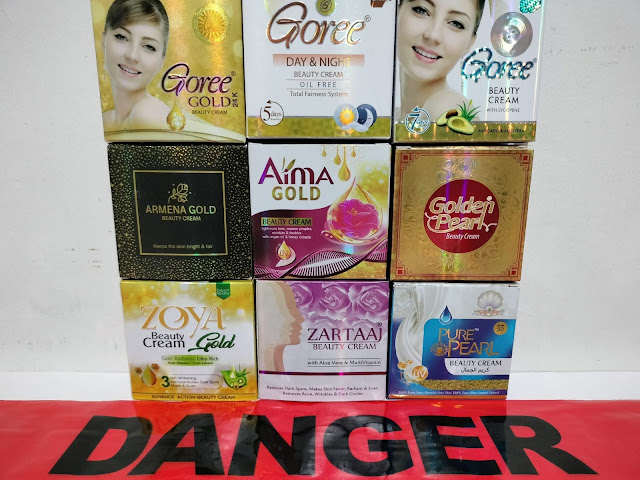EcoWaste Coalition Steps Up Campaign with Its Discovery of More Cosmetics Tainted with Mercury
21 April 2024, Quezon City. On the eve of Earth Day 2024, the toxics watchdog group EcoWaste Coalition drew attention to skin lightening products laced with mercury, a highly toxic chemical that can adversely affect human health, wildlife and the environment.
Mercury, according to the World Health Organization (WHO), can cause skin rashes, scarring and discoloration; reduced skin’s resistance to bacterial and fungal infections; nervous, renal, and immune system damage; and anxiety, depression and psychosis. The application of mercury-containing skin lightening products, as pointed out by the United Nations Environment Programme (UNEP), can further contaminate the surrounding environment and contribute to global mercury pollution.
Following the test buys it conducted on April 20 in Pasay City, the EcoWaste Coalition revealed it has uncovered the illegal sale of more imported skin lightening products with mercury content ranging from 11,940 to 28,370 parts per million (ppm).
The toxics tracker obtained the poisonous cosmetics for P180 to P200 per piece from beauty product stores doing business inside the Baclaran Bagong Milenyo Plaza, Baclaran Terminal Plaza 1, Two Shopping Center, and Wellcome Plaza. Not one of the stores provided an official receipt.
The products were manufactured between March 2022 to December 2023 as shown on the package. The Minamata Convention on Mercury, which entered into force in August 2017, originally set a 2020 global phase-out deadline for the manufacture, import and export of mercury-added cosmetics such as skin lightening creams and soaps.
Among the mercury-added skin lightening creams bought and analyzed were the notoriously toxic Goree Beauty Cream (three variants) and Golden Pearl Beauty Cream, which the Food and Drug Administration (FDA) had already prohibited for containing mercury and/or for being sold without the required market authorization. The remaining five products, which are also unauthorized, have yet to be banned.
With the aid of a handheld Olympus Vanta M Series X-Ray Fluorescence (XRF) analyzer, the following "made in Pakistan" products were found adulterated with mercury, a chemical that is also not allowed in the composition of cosmetic products as per the ASEAN Cosmetic Directive:
1. Goree Day & Night Beauty Cream, 28,370 ppm
2. Pure Pearl Beauty Cream, 27,200 ppm
3. Goree Beauty Cream with Lycopene, 26,630 ppm
4. Goree Gold 24K Beauty Cream, 24,500 ppm
5. Zoya Beauty Cream Gold, 19,170 ppm
6. Aima Gold Beauty Cream, 19,020 ppm
7. Zartaaj Beauty Cream, 14,130 ppm
8. Golden Pearl Beauty Cream, 12,810 ppm
9. Armena Gold Beauty Cream, 11,940 ppm
None of the above mercury-added products listed “mercury,” “ammoniated mercury,” “mercuric chloride,” “mercuric iodide,” “mercury oxide,” calomel or other mercury-related compounds as an ingredient.
Despite screening positive with high mercury content, Goree Day & Night Beauty Cream claims, as written on its label, that it has “no side effects.” The packaging of both Zaartaj Beauty Cream and Zoya Beauty Cream says “contains no harmful ingredients,” with the former even specifying it has no mercury.
A closer examination of the product labels revealed exaggerated product assertions. For example, Armena Gold Beauty Cream claims it offers one solution to 10 skin problems. Aside from age spots, dark circles, freckles and wrinkles, it claims it can brighten "dark elbows,” “dark fingers,” “dark neck,” and “dark feet.” Golden Pearl Beauty Cream boasts of being “the only cream in the world which in a very short time makes you look beautiful.”
During its market monitoring in Pasay City, the EcoWaste Coalition also found other FDA-banned skin lightening cosmetics openly offered for sale to consumers, including China-made Jiaoli Miraculous Cream, Indonesia-made Collagen Plus Vit E Day & Night Cream, and Thailand-made 88 Total White Underarm Cream.
To protect the people, most especially women, children and babies in the womb, from being exposed to mercury in skin lightening products, as well as to protect the environment from mercury pollution, the EcoWaste Coalition proposed the following action points:
- For the FDA to release an updated list of mercury-containing cosmetics and the risks associated with mercury exposure, especially for women of childbearing age, and the consequences of continued use;
- For the Environmental Management Bureau (EMB) to guide stakeholders on the proper storage and disposal of discarded and/or seized mercury-containing cosmetics, which should be handled as a hazardous waste.
- For the Bureau of Customs to block the entry of dangerous cosmetics with mercury by tightening customs monitoring and filing charges against smugglers;
- For the local government units (LGUs) to team up with FDA’s regional enforcement units in conducting law enforcement activities to rid cities and municipalities of dangerous cosmetics with mercury;
- For all concerned regulatory agencies to ensure the right to safety of online consumers against the marketing of products such as mercury-added cosmetics that are hazardous to health, life and the environment; and
- For the management of shopping malls to keep watch on stores operating within their premises to ensure they do not sell unauthorized health products such as skin lightening cosmetics containing mercury and other hazardous substances.
Finally, the EcoWaste Coalition urged the government to advocate for "natural is beautiful," with the support and participation of other stakeholders, to instill people's acceptance of our inherent skin tone, inculcate respect for diversity and promote appreciation that every skin color is beautiful and that skin color and physical looks do not define a human being.
Reference:
https://www.who.int/
https://www.unep.org/
https://www.unep.org/news-and-






Comments